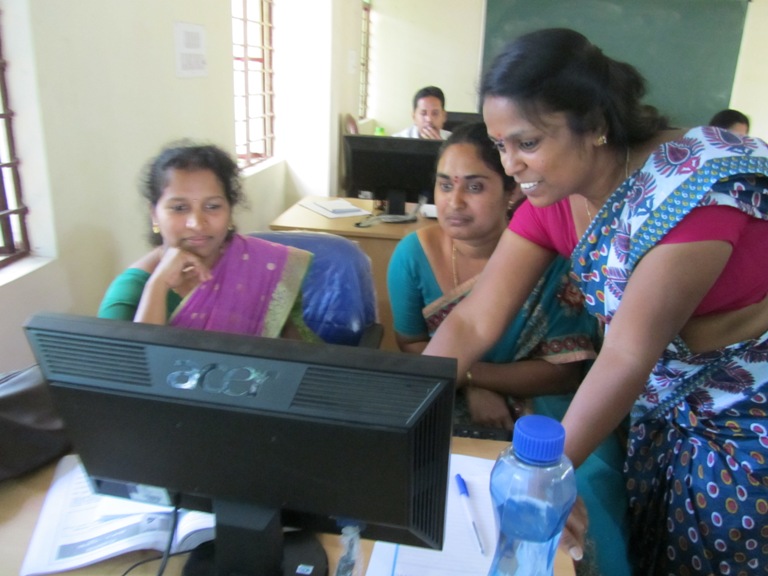The Subject Teacher Forum (STF) an “in-service teacher education” program for high school teachers in Karnataka, was started in 2010-11 by Rashtriya Madhyamika Shiksha Abhiyaan (RMSA) and Directorate of School Educational Research and Training (DSERT) Karnataka, in collaboration with IT for Change. The STF focuses on integrating ICTs for teacher professional development (TPD) as well as for teaching-learning processes in classrooms. The key components of this programme include digital literacy, building collaborative networks of teachers for peer learning and sharing, with an online component called Subject Teacher Forums, and integrating digital methods (tools and resources) for teaching-learning and resource creation.
Over 2011-16, ITfC has trained around 1,400 Government High School teachers in mathematics, science, english and social science, as master resource persons to integrate ICTs for teacher professional development. ITfC has also trained around 100 head teachers, as master trainers, to integrate ICTs for school leadership. These master trainers have trained around 18,500 of their colleagues across the state of Karnataka. All participants have become member of the subject wise virtual forums and are actively sharing ideas, resources, insights and seeking support. The mailing groups have crossed more than 150,000 emails so far, this would perhaps make this the largest programme of its kind in the world (of a professional learning community of teachers working in a single system). These virtual forums are created and maintained by ITfC, working with DSERT and RMSA.
The Karnataka Open Educational Resources (KOER) was started in 2013-14 by DSERT Karnataka, in collaboration with IT for Change, as a component of the STF. Over 2013-16, ITfC worked with around 300 Government High School teachers on a collaborative “Open Educational Resources” (OER) adoption program, to access, create, review, adapt, share and publish OER. Teachers are working on creating supplementary and complementary resources for the class 8, 9 and 10 topics as per the state syllabus. The STF programme has also taken the KOER programme across to teachers in the state and the KOER Kannada and English sites have registered more than 5 million hits.
The STF is in the nature of a systemic and system-wide programme. It is funded, almost entirely through the in-service teacher-education budget of RMSA, it is designed in collaboration with RMSA and DSERT. The DIETs (District Institutes of Education and Training) and CTEs (Colleges of Teacher Education) are implementing the district cascade workshops in their on ICT labs, fully equipped with the required software and digital resources.
The STF aims to demonstrate, how, using the existing personnel, budgets and infrastructure of the teacher-education system in a state, new models of teacher-education can be implemented which are in line with the NCFTE vision of 'need-based, self-directed, self-paced and continuous professional development', which supports seeking, sharing and mentoring. The STF aims at providing a blended model (employing digital and non-digital methods) of teacher-education. By supporting interactions between novice and experienced teachers, as well as with teacher-educators, this model seeks to provide peer-learning and mentoring opportunities.
The STF program has been acknowledged by the third Joint Review Mission of MHRD, its report says " “The JRM team also observed an impressive in-service training program in Karnataka which incorporates ICT in the training (in some government schools teacher support is provided through an open operating system called Subject Teacher Forum under which 5000 teachers across 34 districts have learnt to use digital tools and resources for their subject teaching). - Aide Memoire, 3rd RMSA Joint Review Mission, Ministry of Human Resources Development. January 2014.”
The program has also been praised in a formative review of RMSA teacher training program,
“ …. As demonstrated through the literature review and description of the experience of these two service providers in India, there needs to be a sustained time frame for professional development that is built into the ongoing work of teaching, that is sensitive to context, and that is attentive to broader change processes. Central is explicit consideration to developing a professional community of practice among teachers that will sustain over time within the context of schools and communities. This particular element is openly embraced by both the British Council and IT for Change….” - Formative evaluation of RMSA Teacher Training program, conducted by RMSA TCA, MHRD, March 2016.
The STF program is being taken forward by the education department through the Technology Assisted Learning Program (TALP), in which many of the teachers who are the Resource Persons from the STF-KOER Program are working on creating content based on the NCERT National ICT Curriculum for teachers (teacher professional development) and students (classroom transactions).
![]()

